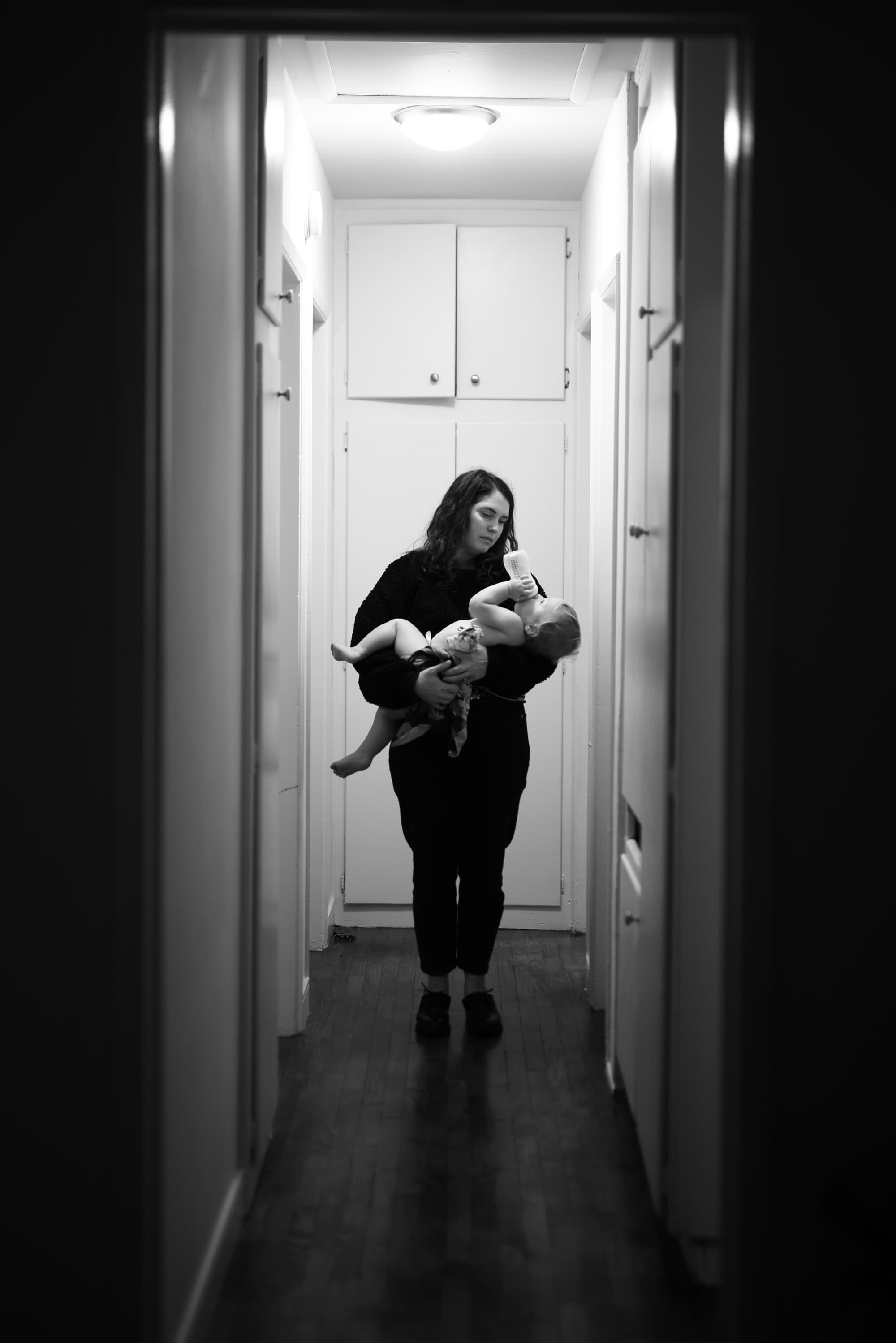It is a paradox: in Switzerland, if both parents work, this often burdens the family fund instead of relieving it. A major reason for this is the high cost of extra-family care, especially for pre-school children. Many parents either pay for childcare entirely on their own or get state support but still bear the main burden. When it comes to financial support for early childhood care Switzerland scores poorly. Only 0.4 percent of the gross domestic product (GDP) is invested by the public sector in day-care centers and childminders. This puts Switzerland in last place in an OECD comparison with other European countries, according to a report by the Federal Commission for Family Affairs (EKFF). For comparison: Denmark, the front runner, invests 2 percent of GDP in early childhood care.
It is a paradox: in Switzerland, if both parents work, this often burdens the family fund instead of relieving it.
But Switzerland is not only stingy in relation to GDP. It also effectively supports families significantly less than other countries. According to estimates, the public sector – mostly municipalities and cantons – only covers an average of 40 percent of the childcare costs. It's often less. On the other hand, the OECD countries show an average support share of 65 to 98 percent for the European countries examined.
The costs of care exceed the income
"We know from studies that it is not financially worthwhile for many families if both parents are employed full-time," says Kathrin Bertschy, co-president of the women's umbrella organization Alliance F and GLP national councilor for the canton of Bern. "Monthly costs often equal generated income if children attend daycare more than twice a week. Even or especially with medium incomes". This fact is one of the main reasons why many women only work a 40 percent workload. Zurich SP National Councilor Min Li Marti agrees with this statement: "The underfunding of early childhood care places too great a financial burden on parents. This leads to false incentives, so that for many it is not worth increasing the workload." In June 2021, Marti submitted a motion demanding that the costs of childcare outside the family should not burden household budgets by more than 10 percent.
Monthly costs often equal generated income if children attend daycare more than twice a week. Even or especially with medium incomes
Huge difference in fees across the cantons
How high the financial burden is for a family depends primarily on where they live. Both the daycare center fees and the level of subsidies vary from place to place. The differences are so great that there is no Swiss-wide survey of them. However, in a study from May 2021, major bank Credit Suisse examined the fees and subsidy regulations of 194 municipalities. Accordingly, parents with medium to high incomes in the cantons of Bern, Zug, and Zurich pay the most for a daycare place (around CHF 130 per day). Daily rates are lowest in Schaffhausen, Appenzell, and St. Gallen at just under 80 francs. The differences in fees for parents with low incomes are even greater. While these families pay 5 francs per day in Geneva, a daycare place costs the same family 85 francs in Schwyz.
Daycare costs almost 25,000 francs a year
A look at the annual costs makes it clear how different and how burdensome they are. The CS study uses a model family for the calculation: a married couple, two children (2 and 3 years old), two days per week care in a daycare center, 140 percent joint workload, annual joint gross income CHF 110,000, assets 100 '000 francs. In this case, the parents pay between CHF 4,700 (Wollerau, SZ) and CHF 24,200 (Wetzikon, ZH) per year. With an annual gross income of 80,000 francs and assets of 50,000 francs, the difference is even greater. The annual daycare expenses vary between CHF 2,900 (Aarberg, BE) and CHF 22,000 (Lüsslingen-Nennigkofen, SO).
"Switzerland is a developing country when it comes to financing third-party care," says Kathrin Bertschy. It still supports a post-war family model in which the men work and the women stay at home with the children. "These patriarchal structures are still reflected in our laws today." This in turn means that current conditions in Switzerland force women to give up their job or at least their desired workload. “In our system, it is still assumed that childcare is a private matter. This is why extra-family care is expensive and not affordable for many. This system reproduces inequality, over and over again,” says Bertschy.
Women are absent from the labor market
However, the topic is not that private. On the contrary: the fact that early childhood care is a burden on the parents' wallets has consequences that go far beyond the family. Across Switzerland, there will be a shortage of around half a million workers in the next ten years. There is a lot of untapped potential for women here. In Switzerland, eight out of ten working mothers with children under the age of 15 work part-time, half of them work less than 50 percent. At the same time, around a sixth of these women would like to increase their workload. What is stopping you? In particular, there is a lack of affordable childcare options. "High parental fees still prevent many mothers from participating more in the labor market," explains Simon Wey, chief economist at the Swiss Employers' Association (SAV). A well-developed and affordable third-party childcare service is an essential contribution to increasing the integration of mothers with low working hours into the labor market. Incidentally, the potential of women can be quantified: According to surveys, the workforce of mothers with children under the age of four alone is around 15,000 full-time positions.
Relief for parents increases GDP
The positive effect does not end with skilled workers. A study by BAK-Economics on behalf of the Jacobs Foundation from 2020 draws a clear conclusion: if Switzerland invests in childcare offers, GDP will grow. Specifically, the study assumes that over a period of ten years, 21,000 additional places will be created in daycare centers and parental contributions will be reduced for everyone. This will cost the state 794 million Swiss francs annually for ten years. The study then forecasts a long-term increase in GDP of CHF 3.4 billion annually. This corresponds to an increase of 0.5 percent.
The reasons for this are diverse. On the one hand, a well-developed, affordable, and high-quality care system ensures that parents can spend more of their time working. For women this would mean additional income and a higher wage in the long term, which in turn would have a positive effect on retirement savings and relieve social security.
On the other hand, according to the BAK-Economics survey, good quality early childhood care in a daycare center strengthens the child's skills. "Studies show that early childhood education and care have a positive effect on children's development, both on their social and other skills," explains Min Li Marti.
Topic is on the political agenda
So science has reached a conclusion. The facts are on the table. But what does that mean in concrete terms for families? Giving an answer is not that easy. Opinions differ widely politically – from status quo to full expansion. One thing is certain: this topic is on the political agenda and can no longer be ignored. Different committees are working on solutions. For the employers' association it is clear: "The state must ensure and finance framework conditions in the form of tax incentives and needs-based, high-quality and financially attractive third-party childcare offers." The association is committed to better financing in the parliamentary alliance "Family-related childcare". The Federal Council has recommended that Min Li Marti's motion be rejected. However, Parliament will still discuss the matter.
The state must ensure and finance framework conditions in the form of tax incentives and needs-based, high-quality and financially attractive third-party childcare offers.
Childcare costs are a national issue
Alliance F President Kathrin Bertschy has clear words and concrete approaches: “New solutions and a rethink are needed. Day care centers are systemically important and they are part of the basic infrastructure.» For the economist it is clear that the topic belongs on a higher level. It cannot be the case that every canton or even every municipality has its own rules for financing. “We are calling for a national fund into which the federal government, cantons and municipalities pay proportionately and from which the costs are covered. Just as it is done for other infrastructure projects, for example with the railways.” For the GLP National Councilor, it is clear that the parents' share of the day-care center costs will have to fall massively in the future. They should be around 30 to 50 francs per child per day.
It's time for something to happen, emphasizes Bertschy: "The importance of the topic has been denied for far too long. This is also due to the fact that the decision-making bodies are still mainly made up of men, but the disadvantages of the system primarily affect women. That has to end now."
The importance of the topic has been denied for far too long. This is also due to the fact that the decision-making bodies are still mainly made up of men, but the disadvantages of the system primarily affect women. That has to end now.




